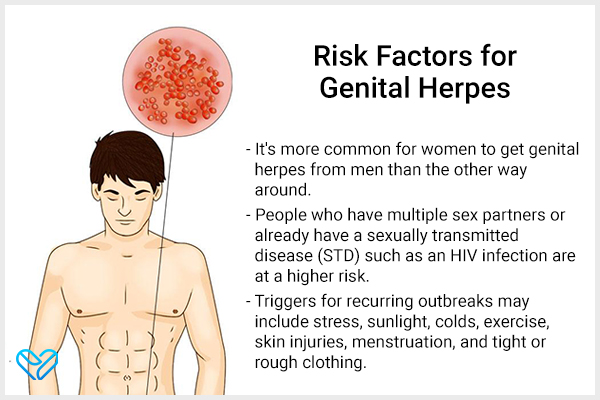In this article:
Genital herpes, although a sexually transmitted infection, is quite common. For most people, it can be an uncomfortable topic to share or talk about. However, it’s really nothing to be ashamed of.

Genital herpes is a condition caused by the herpes simplex viruses (HSV): HSV-1 and HSV-2. (1) The virus is very contagious and can be contracted through sexual acts or intimacy, including vaginal, anal, and oral sex.
People may experience their first case of genital herpes months after getting the infection, and it takes around 20 days to leave if left untreated. Recurrent outbreaks are generally less severe and resolve in around 10 days, but people who have suffered from genital herpes in the past are prone to keep getting it. (2)
Note: HSV-1 causes an average of one outbreak per year in 20%–50% of people, while HSV-2 causes at least one outbreak and an average of four outbreaks per year in 70%–90% of people. (2)
Genital herpes affects millions of people worldwide, and it’s important to understand what it is, what causes it, and what can be done to treat and prevent it. So, continue reading to know more!
What Causes Genital Herpes?
Eight kinds of herpes viruses can infect humans. Once you get infected with a herpes virus, it stays inside your body but remains inactive most of the time. However, sometimes it can become active again or be passed on to someone else.
Genital herpes, as mentioned above, is a result of HSV-1 and HSV-2. These viruses grow in number and move through the nerves to the outer covering of the skin.
The main way it spreads is through direct skin contact during sexual activities, such as oral or anal sex. It can also be transmitted through sharing sex toys.
It’s important to know that herpes viruses can’t stay alive for long outside the body. So, it’s highly unlikely to get the virus from clothing, bedding, or toilet covers. The virus needs direct contact with the skin to be transmitted. (2)(3)
Symptoms of Genital Herpes (Primary and Recurrent)
Here are some symptoms of genital herpes:
Primary genital herpes
When someone is first infected with genital herpes, it is called primary herpes genitalis. In most people, there are no signs. However, if symptoms are present, they generally come up within a week after having sex with an infected person.
The first symptoms are usually tiny blisters with pain that convert to form open sores. These sores can last for up to 3 weeks and can cause pain, burning, and difficulty urinating.
In men, the virus can cause sores or lesions on the foreskin, head, and shaft of the penis. In women, the sores or lesions can occur on the labia, clitoris, perineum, vagina, and cervix.
Other symptoms can include feeling feverish, swelling in the lymph nodes, and inflammation of the cervix (in women) or rectum (in men). (1)
Furthermore, professionals say that, in some cases, genital herpes infection may lead to difficulty urinating, painful urination, trouble emptying the bladder, and constipation. These symptoms can change depending on the person and their case.
Recurrent genital herpes
After the initial outbreak, the herpes virus can remain in the body and become dormant in the nerve cells. This is called latency.
The virus can become active again later on, which is called recurrent herpes genitalis. The virus reactivation is often a result of triggers such as diseases, stressors, and hormonal imbalances. (4)
Recurrent outbreaks are usually not as severe as the first outbreak. Before the blisters appear, people may feel like their skin is a bit itchy with a tingling sensation or experience pain in their private region.
Recurrent outbreaks can cause emotional stress for people who have genital herpes and their partners. (1)
Note: When the herpes virus is in a latent state, it can become active again without causing any noticeable symptoms. This means that people who have the virus but don’t have any symptoms can still transmit the infection.
Transmission of Genital Herpes

Genital herpes is spread via sexual activity, especially during intercourse. It’s more common in young adults who practice oral sex.
The virus can only survive for a few days on moist surfaces, so it’s not typically spread through other means such as touching objects.
Pregnant women with herpes can transmit the virus to their infants, which can cause some health problems. The probability of this happening is elevated in the first 20 weeks of pregnancy and with primary maternal herpes. (1)
Testing and Diagnosis for Genital Herpes
Doctors diagnose genital herpes through these steps: (2)
- A doctor will take some skin cells from the infected region.
- The sample is then tested in a laboratory for herpes viruses.
- Based on the condition, the kind of virus can also be figured out.
- It’s often not possible to diagnose genital herpes based solely on the symptoms and appearance of the skin.
- If there are no signs, some testing for viral antibodies can be done to check for the virus in the blood.
Treatment for Genital Herpes
The medical treatment for genital herpes includes:

- First outbreaks of genital herpes can be pretty rough, so taking antiviral medications can help decrease the seriousness of symptoms and duration of the outbreak. (2) Antiviral medications include aciclovir (200 mg, five times a day for 10 days), valaciclovir (1 g, twice a day for 10 days), and famciclovir (250 mg, three times a day for 7–10 days). (5) Note: Creams or ointments containing antiviral drugs won’t work. Plus, doses are adjusted for renal insufficiency.
- For later outbreaks, the symptoms are usually less serious and treatment may not be required. But if you do experience symptoms, antiviral medications can help.
- Patients with frequent outbreaks (more than six) may receive suppressive antiviral therapy with aciclovir (400 mg, twice a day), valaciclovir (500–1,000 mg, once a day), or famciclovir (250 mg, twice a day).
- If you’re experiencing severe pain, painkillers can help. (2)
Is There Vaccination for Genital Herpes?
There is currently no licensed vaccine for genital herpes. Researchers have been studying therapeutic and prophylactic vaccines to prevent the recurrence and initial infection of herpes.
HSV-2 is the main focus of research for these vaccines. Previous trials of vaccines in humans have not shown convincing results for licensing a vaccine. (1)
Risk Factors of Genital Herpes

Here are some things to remember regarding the risk factors for genital herpes: (2)
- It’s more common for women to get genital herpes from men than the other way around. This could be because the virus can spread more easily from the man’s private part (penis) to the woman’s private part (vagina) during sex.
- People who have multiple sex partners or already have a sexually transmitted disease (STD) such as an HIV infection are at a higher risk.
- Triggers for recurring outbreaks may include stress, sunlight, colds, exercise, skin injuries, menstruation, and tight or rough clothing.
Complications of Genital Herpes
Genital herpes isn’t just uncomfortable; it can also lead to some possible complications:
- Vaginal yeast infections (thrush)
- Bladder problems with trouble urinating
- Rare cases of meningitis
- Increased risk of contracting more infections such as HIV
Although rare, herpes infection may cause big rashes in other places of your body and can even be an issue for your eyes. So, it’s important to talk to your doctor if you think you have genital herpes. (2)
Note: If you’re pregnant and have genital herpes, there’s a small chance you could pass it on to your child during birth. Doctors may recommend a C-section to minimize the risk. (2)
When to See a Doctor
It’s especially important to seek medical attention if you have multiple sexual partners or if you’ve had unprotected sex with someone who has herpes.
A doctor can diagnose herpes through a physical exam and/or a laboratory test and can also provide you with information on how to manage the condition and prevent the spread of the virus.
Final Word
Remember, herpes is nothing to be ashamed of. If you think you might have genital herpes or any other sexually transmitted infection, it’s important to talk to a healthcare provider as soon as possible.
They can give you the right diagnosis and treatment to help you feel better and prevent the spread of the infection to others.
 Continue Reading11 Home Remedies for Genital Herpes and Preventive Tips
Continue Reading11 Home Remedies for Genital Herpes and Preventive Tips
- Was this article helpful?
- YES, THANKS!NOT REALLY


